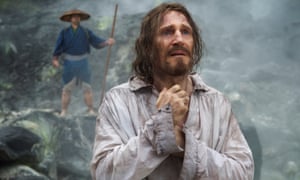SILENCE
Director : Martin Scorsese
Year : 2017
Genre : Drama
Rating : ***

If Martin Scorsese needed to cleanse his Catholic soul after helming the hedonistic (yet wildly entertaining) debauchery of 2014's 'The Wolf Of Wall Street', then making 'Silence' should go some way towards his therapy. Starring Andrew Garfield, Adam Driver and Liam Neeson, this long-gestated adaptation of Shusaku Endo's highly revered book surrounding the well-documented persecution, torture and executions of Christians in 17th century Japan is all at once a beautiful, haunting, disturbing and ponderous 161 minutes of cinema that may boast incredible cinematography, a roster of fine performances and typically masterful direction from Scorsese but is ultimately crushed by it's overlong running time and it's own sense of grandiose self-importance.
Garfield and Driver play Rodriguez and Garupe respectively, two young yet ambitious Portuguese priests who embark on a potentially deadly journey to Japan to uncover the truth about a respected Catholic missionary (Neeson) who is reported to have denounced his faith. Along the way, they are aided by many devout Japanese Christians who even with the very real threat of murder looming over their heads, continue to worship and spread the beloved word of God.
Martin Scorsese has battled with bringing Endo's incendiary 1966 novel to the screen for a number of decades now and his efforts have not been in vain. For the most part. For one, 'Silence' looks incredible - director of photography Rodrigo Prietro (who also worked with Scorsese on the aforementioned 'The Wolf OF Wall Street') utilising misty terrains and seemingly tranquil settings to create a palpable air of harmonious serenity and sometimes frighteningly agoraphobic isolation. This cinematographic aesthetic also adds emphasis to the films numerous torture and execution scenes which, while necessarily horrific, are all captured with a perverse calm and beauty which only adds to the cruel brutality of the violence taking place on screen. Underpinning all of this visual wonder is nothing but the incomparable sounds of nature; the film lacks any discernible non-diegetic score which adds yet another heightened sense of reality and stoic respect for the material being told.

The performances too carry an air of genuine authenticity. Both Andrew Garfield and Adam Driver deliver great work here, with Garfield giving a potentially awards-worthy turn as the troubled Father Rodriguez whose apparently unshakable faith is continually tested in the face of evil - one stand-out scene in which his own reflection appears to morph into the face of Jesus himself serves as both a moving epiphany and, conversely, a self-aggrandizing act of psychological vanity. Supporting Garfield, Liam Neeson impresses in his small yet significant role as Father Ferrera, the Jesuit missionary who may or may not have turned his back on God while Driver is very good but isn't giving enough screen time to really develop his character of Garupe. But it is the Japanese cast who really stand out here. Yosuke Kubozuke is absolutely terrific as the troubled guide Kichijiro who becomes Rodriguez's own Judas Iscariot while Issey Ogata is both horrifying and blackly humorous as the much-feared inquisitor whose frail frame and witty quips hide a stone cold heart full of hatred.
'Silence' certainly go out of it's way to ask important and pertinent questions about religion, martyrdom and indoctrination and thankfully, it doesn't go out of it's way to answer them. Like the best cinema, the film leaves its audience to make its own mind up and I greatly admire any picture that respects the intelligence of it's viewers. But beyond it's beautiful visuals, great performances and interesting ideologies, I must admit that I didn't particularly enjoy watching 'Silence'. Much like Alejandro G. Innaritu's 2016 Oscar-darling 'The Revenant', I respect the film more than I like it. I don't think it's stands as one of Martin Scorsese's best works, even if it's his most personal in years and despite it's reverence for it's extraordinary source material, it compares unfavourably to both 'The Last Temptation Of Christ' or 'Kundun' - two previous Scorsese films that explored the themes of religion in much more interesting, incendiary and crucially, more entertaining ways.

No comments:
Post a Comment